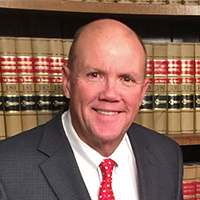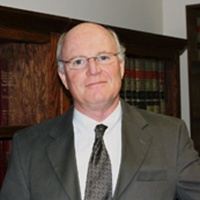 Midland City Felony Lawyers, Alabama
Midland City Felony Lawyers, Alabama
Not enough matches for Midland City Felony lawyer.
Below are all Midland City Criminal lawyers.
Sponsored Lawyers
1-10 of 10 matches
Divorce & Family Law, Criminal, Accident & Injury, Business, Estate
William Matthews, Jr. is a practicing lawyer in the state of Alabama specializing in Divorce & Family Law; Criminal; Accident & Injury; Bankruptcy & Debt; Estate. Mr. Matthews received his J.D. from the University of Alabama School of Law in 1981.
(more)Accident & Injury, Criminal, Divorce & Family Law
Attorney Steven G. McGowan is a Dothan personal injury lawyer who delivers well-researched and strategic courtroom arguments. He is an experienced trial lawyer who believes courtroom litigation is the best way to seek justice for his clients. His practice encompasses several areas of law: Family Law, Criminal Law & Bankruptcy - Personal Injury - Immigration Law - Social Security, Workers Comp & General Litigation - Divorce Law A focus on Personal Injury & Immigration Law A majority of Mr. McGowan's cases involve personal injury and immigration law. For his personal injury clients, he remains a strong and relentless force, fighting for the compensation his clients need to alleviate the burden of serious injuries and damages. Mr. McGowan handles immigration cases with an equally aggressive stance, so he can protect the rights of foreign nationals during their interaction with the U.S. justice system. He explains the laws and mandates that affect their cases in a simple, straightforward manner. Get Mr. McGowan Fighting for You Do not waste any time contacting Mr. McGowan when you have an important legal issue to discuss. Many cases are bound by strict legal timeframes, and Mr. McGowan responds quickly to give clients the best representation possible. Mr. McGowan stands ready to take on any case in his practice areas if he believes he can truly help the client.
(more)Divorce & Family Law, Criminal, Estate
Scott Smith became an attorney out of his desire to help others. “Too many times individuals are faced with legal situations they are unable to navigate on their own,” Scott says. “That is where I come in,” explains Scott. “It does not matter if it’s a criminal, a family law, or a business matter, you need someone that can stand up for you and advocate for your best interest.” During an initial consultation with Scott, you will find him receptive to your needs. Scott then works one-on-one with each client to identify their goals and priorities and how the law relates to their unique situation. Scott then designs a strategy focused on each clients’ unique situation and interests. Scott was born in Dothan, Alabama and has a real passion for his community. A graduate of Cottonwood High School, Scott worked for two different Fortune 500 companies during the day, while he attended Troy University Dothan at night. Scott graduated with honors from Troy with a Bachelor of Science in Business Administration, majoring in finance. Driven by his desire to help others, Scott attended Faulkner University, Jones School of Law. Scott knew that he would be most effective as an attorney if he fully dedicated himself to learning the law. His hard work and dedication in law school earned him the honor of graduating first in his class (summa cum laude) and induction into Order of Barristers. Also, Scott served as the Editor-in-Chief of the Faulkner Law Review, where he helped guide this prestigious publication to new heights. Scott also participated in trial advocacy during law school, where he traveled the nation competing in and winning national trial competitions. After graduation, Scott furthered his legal education and understanding of the law from the “other side of the bench” when he served as a law clerk to a United States District Judge for the Southern District of Alabama for two years. Scott is ready to serve you no matter your legal need.
(more)Divorce & Family Law, Criminal, Estate
ABOUT OUR DOTHAN, ALABAMA LAW FIRM When you hire the team at Smith Law Firm, to work on your behalf, you have the benefit of knowing that we will take every measure necessary to ensure that your freedom, liberties and rights are protected. Whether you are facing serious criminal accusations, a divorce or the aftermath of a serious injury, our team has the experience to help you effectively resolve the issue you are facing. One attorney will be assigned to your case and you will be known on a first-name basis with our legal team. We are widely recognized for our legal abilities and are members of organizations such as: Top 100 Trial Lawyers In Alabama National Trial Lawyers Association National Association of Criminal Defense Lawyers (NACDL) Real Lawyers, Real Defense At Smith Law Firm, we are more than just strong representation — we are personal advocates for our clients. We are highly experienced, knowledgeable of the law and know when to expect challenges. Our goal is to restore justice and peace in our clients’ lives, even when a complex legal battle is involved. We will help you get to a point where you and your family can move forward. Tailoring Legal Services To Meet Our Clients’ Needs Smith Law Firm, serves people from all types of backgrounds and professions. Because our clients range, so do our services. We cater our services toward the specific needs that our clients have and recognize that every client will have unique challenges. Our lawyers listen, provide guidance and will take time to answer your questions. We are here for you.
(more)








